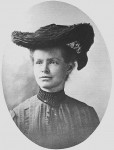In addition to having fabulous taste in hats, Nettie Stevens is also an underappreciated scientist. She was a cytologist, embryologist, and entomologist at Bryn Mawr, where she worked with Edmund Wilson and a certain fellow you have almost certainly heard of, Thomas Hunt Morgan. In fact, she’s the person who introduced TH Morgan and Drosophila, so we would owe her just for that.
But her main claim to fame is that she’s the person who figured out all that business about X and Y chromosomes — the chromosomal basis of sex determination. Strangely, most of the genetics textbooks grant all the credit for that to TH Morgan, I can’t imagine why. Oh, wait, I can guess. When Stevens died, Morgan got to write her curiously distant obituary in Science, where he credited her with a “share” in the discovery. It’s not a terrible obit, in that he does discuss the breadth of her work, but otherwise it’s rather dry and nitpicky.*
But you know she had to be remarkable in many ways. She was a woman in a deeply sexist culture, and she was forty years old when she started studying biology in 1901, so she already had the deck stacked against her. Yet she managed to build a commendable career in just a few short years — she died in 1912 of breast cancer, just before finally getting a faculty position — and it’s a shame that what must have been a fascinating person has been lost in the rush to take credit for her work. She’s someone who deserves a bigger place in the textbooks.
*The part that annoyed me most in the obit was in the first paragraph, where he credits some of her success to the “liberality of Bryn Mawr College, which created for her a research professorship”. Was it also very generous of Bryn Mawr, Columbia, and Cal Tech to grant poor TH Morgan research positions at their institutions? It sure was liberal of them to let him in the door.



I’d be inclined to dismiss such attitudes as just how people were back then, if not for the fact that a depressing number of people still behave like that.
Happy Birthday, Nettie Stevens. No, I never heard your name in high school or in college biology class. Admittedly, I only took introductory level courses, but still.
Were it not for PZ, I still wouldn’t know anything about Nettie Stevens.
Female biologists made a large contribution to cytogenetics in the first half of the 20th century. Look up also the work of Lillian V. Sampson (Morgan), whose work was quite extraordinary. Also Harriet Creighton. And of course the greatest of them all, Barbara McClintock. Although recognition of her work on “jumping genes” came in the latter half of the 20th century, she had by 1944 made enough other remarkable discoveries to be elected to the National Academy of Sciences and in the same year to be elected the first female President of the Genetics Society of America. All faced appalling discrimination, but McClintock’s achievements were so great, and so many, that she commanded respect.
I was taught Advanced Genetics by Larry Sandler at the University of Wisconsin in 1962. Larry, whose wife Iris Sandler was herself an outstanding geneticist, told us of the importance of work of all these women. Although no one could explain the weird results of McClintock’s maize crosses, Larry pointed out that as they came from McClintock you could not simply dismiss the results as a mistake.
I think all the smart people learned genetics from Larry Sandler.
Sounds like you did (he taught most of his career at UW, in Seattle). He often claimed that he had been a terrible teacher the first time he taught. I later found out that the class I took from him in Wisconsin was in fact that first class. Of course, he was great in it.